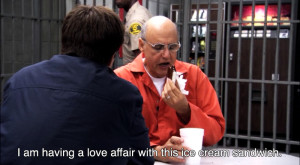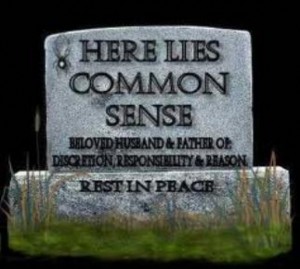[In which your Beleaguered Instructor admits to breaking correction’s Cardinal Rule, and pays dearly for it straight through the heart….]
Today, a clerk tells me that Bob Merkin has finally left Norfolk; a shiver goes through me, and I instantly miss him.
I wish I had the writing skills to tell you exactly why. The only thing I can think to say is , when a prisoner that you’ve enjoyed as a human being leaves, it’s like having a friend die.
Yes, yes YES! You’re not supposed to get that close with inmates, and I understand why. But the truth is that it sometimes happens, you know that it’s happening, and you allow it to happen because you know what this individual brings to your work life. You never forget that the guy is a prisoner, but you always thank him for what he brings to the work place, and try to never miss an opportunity to make him feel appreciated. Inmates like him–no, PEOPLE like him—come once in a blue moon. For every thousand inmates you have a Bob Merkin and as there are only 12,000 inmates in this system you get the idea. I know I can’t replace him. And of course that’s what makes him special.

We worked side-by-side, both figuratively and literally. He was like a second staff member in the Library. Inmates do not like being thought of in that way, and I understand why. But there it is. If he had been a Department employee, he could not have helped me more. He literally re-invented the legal copy clerk position.
I’ve had copy clerks before, many of them. All they did was show up for work and push the Big Green Button. Bob just didn’t copy legal papers. Robb knew court rules off the top of his head which came in handy when determining how many of what kind of legal document or submission needed to be copied. Sometimes inmates ask for too many; other times, they ask for too little. Bob had no problem with keeping inmates honest. I think this was because he knew that the copy procedure—though nowhere near the free-for-all it used to be—actually worked, and he wanted to support that procedure.
His knowledge of court submissions rivaled that of any jailhouse lawyer, and this was something I didn’t know when I hired him. His familiarity with Massachusetts judges, of inmates’ individual filings, and of the court rules governing both federal and state submissions brought a new dimension to the legal copy clerk job. It never occurred to me when hiring for a copy clerk that I should be looking for an inmate with extensive familiarity with court rules. I have learned a great deal more about civil and criminal court submissions from working with him, and I am grateful.

He has this youthful appearance to his face, even though he’s in his early 40’s, and an easy smile that when it comes –and it comes frequently—makes your burdens a little lighter each time. He also has a sense of humor that allows my own humor to flourish, which makes it easy to be around him. He permitted us to joke about ethnicity and race and—since he is a black man—is refreshing and liberating. Especially to someone like me whose humor was weaned on Don Rickles and Andrew Dice Clay and the attack humor they were best known for. He is by no means politically correct, and anti-PC humor is particularly welcome and useful in a prison setting.
His humor style flew in the face of the regulations and policies in place warning us all that we’re not allowed to offend each other. Rob understands that life is offensive, and prison is offensive, and the Entitlement Attitude is offensive, and crime and the criminal mentality is offensive, and stupidity is offensive, and incivility is offensive. These personality traits manifest themselves in the daily lives of prisoners and prison employees, and Bob knows that it’s better to laugh at those traits than to punch the empty heads of the people exhibiting them….Together we made fun of all these things, and I cherished the freedom to do so with this man who is never afraid to thumb his nose at the cultural Thought Police. His attitude is: “You’re full of shit; I know you’re full of shit, and I’m going to laugh at just how full of shit you are. Excuse me? You say I’m not allowed to do that? Aw, HELL no. My Grandma raised me better than that.”

We also talk about other things that matter, like our families and raising children and keeping a wife happy and what to say when a loved one of a friend passes on and how to control your anger when dealing grudgingly with fools and making fun of fellow clerks and their peccadilloes, and how The System sometime hurts people, and how manipulating certain inmates are.
Bob knows how helpful certain staff can be even though they may be unpopular and have a certain negative reputation. In fact, I emailed my boss’s boss to tell her his good opinion of her, and how helpful he always found her to be even though it’s generally believed that she’s unhelpful. This employee wears her heart on her sleeve, and was appreciative of the man’s comments, as I knew she would be. Prison employees rarely hear inmate praise, which is why I was happy to pass his words on to her.

His words made her day, and he made that happen because he was comfortable enough to share his opinion with me. His courage to voice true feelings for a staff member who is generally seen as unhelpful is one of the reasons I am fascinated by this man. He knows what he knows, and he’s not afraid to tell others about it, even if it doesn’t jibe with the conventional inmate wisdom. Bob is savvy enough to know that the conventional wisdom is often wrong. And that, Dear Hearts, is true wisdom.
His political opinions of prison and prisoners are aligned with mine, and it’s refreshing to hear him unabashedly voice it in the company of other inmates. His social views are decidedly conservative in many respects, which is a refreshing change from the liberal rants you usually receive from the incarcerated. And if inmates screw up, he unflinchingly and unhesitatingly condemns them in the presence of other inmates, which is a kind of intellectual courage and honesty you do not often see displayed.
And although this behavior can sometimes be used by manipulative inmates to secure the confidence of the on-site employee supervisor so that they won’t be scrutinized as closely as other clerks, such was not the case with this individual. I say this with confidence because we worked side-by-side for nearly three years, and in that time a man will surely pull the covers off of a manipulative personality if he possesses one. This man is what-you-see-is-what-you-get. This man learned a lot about himself in his incarcerated time (15 years), and isn’t about to let the vagaries of prison and criminals deter him from losing the self-knowledge he painfully gained through soul-searching, prison programs, and learning about his anger issues.

We both have anger issues, and here I feel closest to him, because I know that this is a fellow traveler who understands my own cross, and is quick to forgive my transgressions against him because he recognizes the signs. I am grateful to him for this. It taught me to be more forgiving of those who have a similar burden, and not just in inmates but in staff as well. Anger is an unresolved issue for many prison employees. It helps to be able to share it with someone who’s been there/ done that. I will miss his support and encouragement.
Another fascinating and sad aspect of Robb’s incarceration is that his own father is imprisoned with him. In fact, he didn’t really know his Dad until the older man was transferred to Norfolk. So we got to talk about that aspect of his life, and what it was like to catch up with a father whom for years had been an absent, unknown quantity. He was happy to have the opportunity to get to know his Dad.

Bob is that rare prisoner who has learned to own his crime and feel true regret for what it has done to others. Of course he’s sorry that jail happened to him, but he has learned to be sorry for his victim. He is very lucky that his victim did not die. He has contacted his victim, and his victim has forgiven him, something that Bob counts as a daily blessing. This forgiveness helps him to continue his self-discovery which served to make him a better, rehabilitated human being. He shows insight into his criminal thinking, and takes the hard steps to try to leave it behind.
Bob has several step-children and a loving wife waiting for him. His family has stuck with him through it all, which will forever amaze me about women and children and their resiliency in the face of incarceration. They visit him often, accept his collect calls each week, and send him packages and letters. And not just his own family, but his extended family; he talks of his Aunts and his brother and his nephews & nieces. Unlike the majority of inmates, Bob’s bridges were never burned. His family awaits him. Because of them, he will never return.
I am a better man for the blessing of knowing Bob Merkin. I will never see him again, which is painful to write. I will try to remember that smile, because it’s an uplifting smile, and I will be happy knowing that he’s now sharing it with the people he loves, and who love him.





















